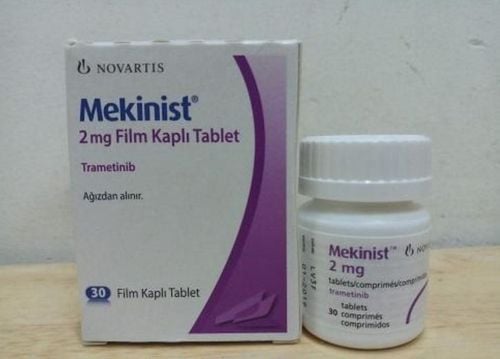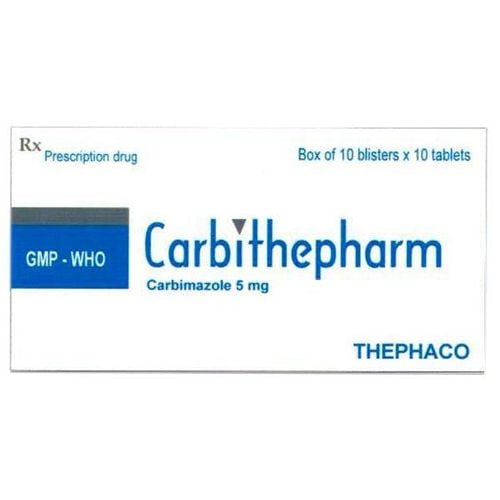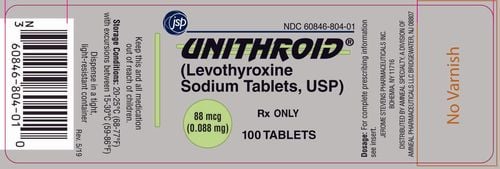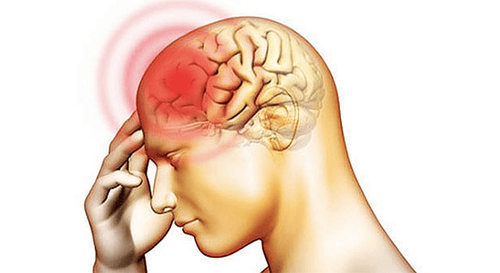This is an automatically translated article.
Thyroid cancer is quite common compared to other cancers and is more common in women than men. When hearing about cancer, most people are very worried about their medical condition. However, according to research, thyroid cancer grows quite slowly, has a good prognosis, and the disease has a higher cure rate if detected early.
1. What is thyroid cancer?
The thyroid gland is the largest endocrine gland in the body, which secretes thyroid hormones such as thyroxine, triiod-thyroxine, and calcitonin-secreting parafollicular cells. The thyroid gland is located in front of the cervical trachea, consisting of 2 lobes left and right, connected by an isthmus.Thyroid cancer is an abnormal proliferation of thyroid cells. It is the most common malignancy among endocrine adenocarcinomas.
Thyroid cancer is a disease with a good prognosis and can be cured if detected early. When thyroid tumor appears, it will affect health, causing pain, difficulty swallowing, shortness of breath and coughing a lot... Therefore, as soon as thyroid cancer is diagnosed, patients need to be treated as soon as possible. the better.
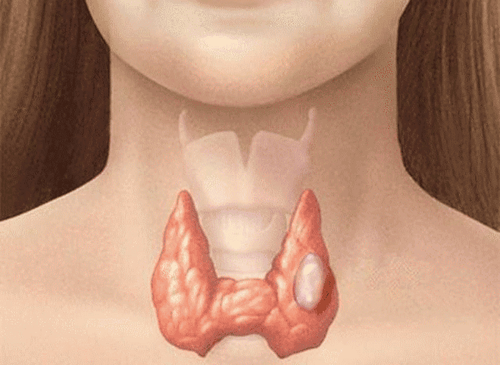
Ung thư tuyến giáp là tình trạng tăng sinh bất thường các tế bào tuyến giáp
2. Causes of Thyroid Cancer
The cause of thyroid cancer is not exactly known, but some factors can increase the risk of thyroid cancer, such as:
Diseases related to genetic factors: People with If there is a family history of a parent or relative with the disease, the risk is higher. Gender: Women are 2-4 times more likely to get the disease than men. Often due to hormonal factors in women that stimulate the formation of nodules in the thyroid gland, these nodules can develop into cancer. Thyroid disease: People with thyroid disease, thyroiditis, basedow's disease, hypothyroidism have a higher risk of thyroid cancer than others. Radiation contamination: The human body can be contaminated with radiation through the digestive tract, through the respiratory tract, which also affects the thyroid gland. Some other risk factors: Iodine deficiency or excess, frequent alcohol consumption, smoking, overweight and obesity ...
3. Signs to recognize thyroid cancer
Thyroid cancer, like other cancers, has no characteristic symptoms in its early stages. Thuong discovered by accident during routine physical examination or when monitoring other diseases of the thyroid gland.
There may be some manifestations of thyroid disease such as:
Thyroid goiter: The tumor can be seen with the naked eye, is hard, has clear margins and moves with swallowing rhythm. Abnormal cervical lymph nodes may be present. The lymph nodes are usually small, tender, mobile, and on the same side as the tumor. Some symptoms of the disease in the late stages:
The patient may lose weight for no apparent reason. Tumor is large, dense, moving with swallowing rhythm. When the large tumor presses on, it causes: Hoarseness, difficulty in breathing, difficulty in swallowing, difficulty in swallowing, due to the tumor compressing the floating cervical lymph nodes. The skin of the neck may be infiltrated or ulcerated with bleeding.

Khi ở giai đoạn muộn bệnh nhân có thể giảm cân không rõ nguyên nhân
4. Is thyroid cancer curable?
Thyroid cancer is a disease with a good prognosis, compared to other cancers. Due to the nature of thyroid cancer, it progresses slowly and the rate of complete cure is high if it is detected and treated in the early stages.
If thyroid cancer is treated right from stages I and II when the tumor is still in the thyroid gland, has not spread to other locations of the body, the 5-year survival rate is nearly 100%, the survival rate over 10 years is over 75%. If treated in stage III when the tumor is larger than 4cm, has grown outside the thyroid gland and may have spread to lymph nodes in the neck area. The 5-year survival rate is over 80%. Stage IV is when the tumor has spread beyond the thyroid gland and may have spread to other organs. The 5-year survival rate at this stage is less than 50%, depending on the specific case. In addition, depending on each type of cancer, the cure rate is different, such as papillary thyroid cancer, the 5-year survival rate is over 95% and the 10-year survival rate is over 90%. Follicular thyroid cancer has a 5-year survival rate of over 90% and a 10-year survival rate of over 70%. Medullary cancer has a 5-year survival rate of 90% and a 10-year survival rate of over 86%. Particularly for undifferentiated cancer, the incidence is lowest and the prognosis is the most severe, usually detected when metastasized, the survival rate is usually less than 1 year.
In general, the disease can be completely cured if detected early. Patients with abnormal symptoms should see a doctor for early detection. Especially for patients with thyroid disease that need periodic checkups, those who have a family member with thyroid cancer.
5. Thyroid cancer treatments
Depending on the disease and each stage, thyroid cancer has treatment measures including:
Surgery: Surgery is the main treatment method, patients are carried out surgery depending on the size, location and metastatic status of the tumor. Usually, surgery can remove the thyroid lobe, total thyroidectomy, and partial thyroidectomy. Radioactive I-131 Treatment: Thyroid cancer usually responds well to radioactive I-131 treatment. After surgery, treat with I-131 so that any remaining thyroid tissue can be destroyed. Because the cells of other organs in the body do not have the property of capturing I-131, they are less susceptible to the effects of this radiopharmaceutical. Radiation therapy: Indicated in cases of thyroid cancer that has metastasized, because surgery and I-131 therapy are often ineffective in this case. External radiation therapy can be used to treat metastatic conditions and can reduce the growth and spread of malignant cells. Thyroid cancer is a disease with a good prognosis, if detected early, the possibility of complete cure is very high. That's why it's so important to have regular health check-ups for early detection.
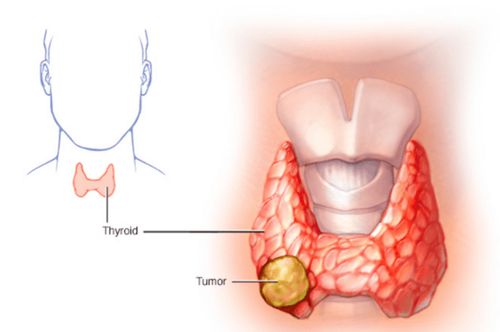
Bệnh ung thư tuyến giáp là bệnh lý có tiên lượng điều trị tốt, nếu được phát hiện sớm thì khả năng khỏi hoàn toàn rất cao
Currently, Vinmec International General Hospital has a package of screening and screening packages for thyroid diseases. When choosing the Package of Screening and Screening for Thyroid Diseases at Vinmec, you will be examined by experienced thyroid specialists to help screen and detect common thyroid diseases early. variables such as: simple goiter, hyperthyroidism, hypothyroidism, thyroiditis, thyroid nodules, thyroid cancer,...
At the same time, you will have blood tests, evaluate the levels of functional hormones. thyroid such as FT3, FT4, TSH, Anti - TPO, Anti TG and ultrasound, scan to evaluate the structure of the thyroid gland. After that, when the results are returned to the doctor, you will be consulted about thyroid pathology, and discuss the appropriate treatment options for yourself. From there, thyroid disease will be prevented in time, avoiding long-term health damage in the future.
>> See also: Early detection and diagnosis of thyroid cancer – Article written by Specialist Doctor I Nguyen Thi Minh Thuyen - Pathologist, Laboratory Department - Vinmec Da International General Hospital Nang
Please dial HOTLINE for more information or register for an appointment HERE. Download MyVinmec app to make appointments faster and to manage your bookings easily.




